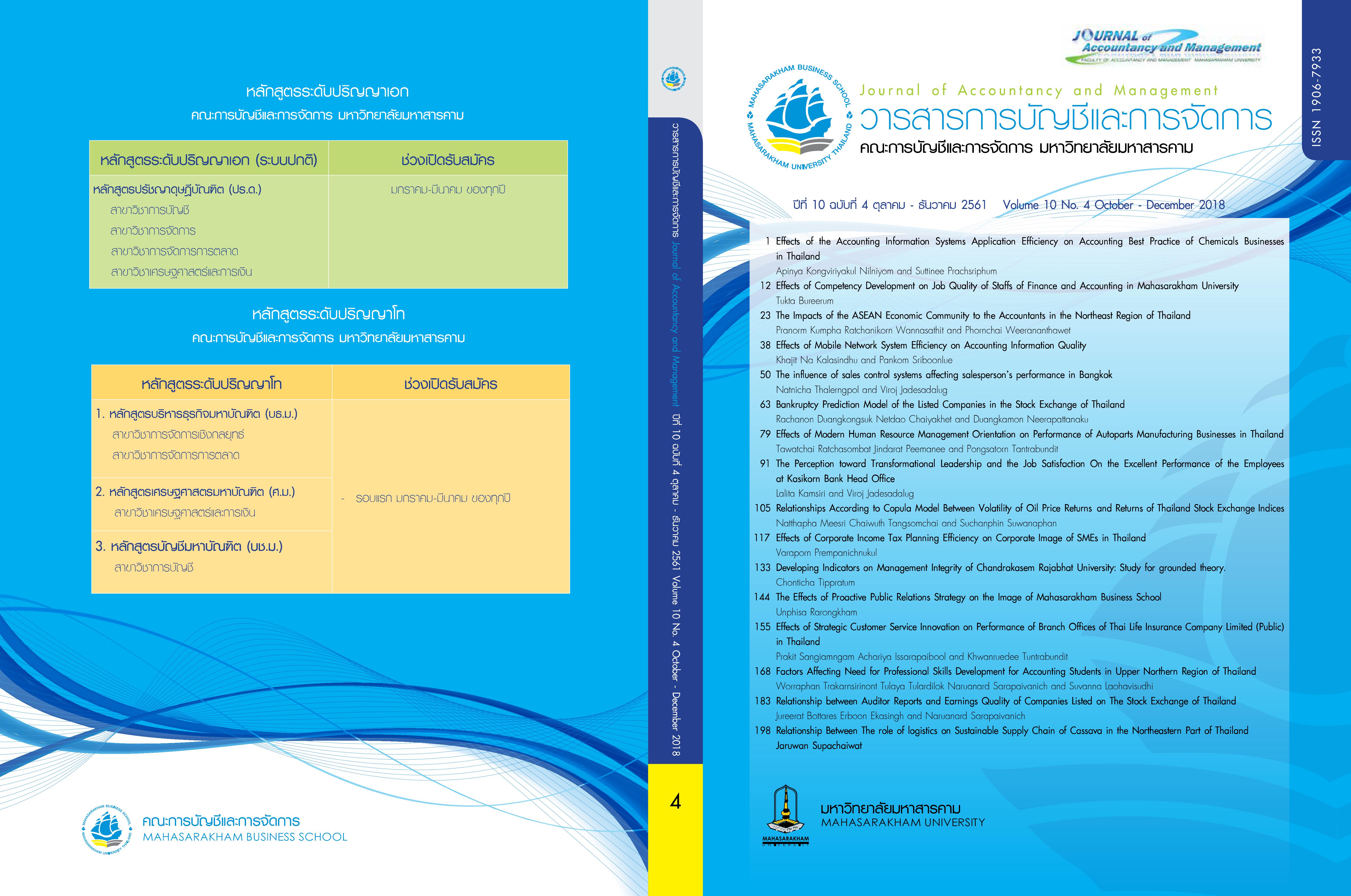ปัจจัยที่มีผลต่อความต้องการพัฒนาทักษะทางวิชาชีพของนักศึกษาสาขาบัญชี ในเขตภาคเหนือตอนบนของประเทศไทย
Main Article Content
บทคัดย่อ
การศึกษาครั้งนี้เป็นการศึกษาปัจจัยที่มีผลต่อความต้องการพัฒนาทักษะทางวิชาชีพของนักศึกษาสาขา
การบัญชี ตามมาตรฐานการศึกษาระหว่างประเทศสำหรับผู้ประกอบวิชาชีพบัญชี ทั้งทักษะด้านความรู้ความสามารถ ทักษะทางวิชาชีพ และค่านิยม จริยธรรม และทัศนคติทางวิชาชีพ โดยใช้ปัจจัยความต้องการของมนุษย์ตามทฤษฎีแรงจูงใจของแอลเดอร์เฟอร์ ประกอบด้วย ความต้องการเพื่อการดำรงชีพ ความต้องการด้านความสัมพันธ์ และความต้องการความเจริญก้าวหน้า โดยเป็นการศึกษาเชิงคุณภาพ และเชิงปริมาณ เริ่มจากการสัมภาษณ์เชิงลึกผู้ที่มีส่วนเกี่ยวข้องกับการพัฒนาทักษะทางวิชาชีพของนักบัญชี ได้แก่ ผู้สอบบัญชี ผู้เชี่ยวชาญทางด้านบัญชีในสภาวิชาชีพบัญชี และผู้บริหารของสถาบันการศึกษาที่มีการเรียนการสอนในสาขาการบัญชีในเขตภาคเหนือของประเทศไทย เพื่อเป็นแนวทางพัฒนาแบบสอบถาม และเก็บข้อมูลจากนักศึกษาสาขาการบัญชีที่ผ่านการฝึกทักษะทางวิชาชีพด้านการบัญชีมาแล้วของสถาบันการศึกษาในเขตภาคเหนือของประเทศไทย จากการศึกษาพบว่า ความต้องการเพื่อดำรงชีพ และความต้องการความเจริญก้าวหน้ามีความสัมพันธ์เชิงบวกกับความต้องการพัฒนาทักษะด้านความรู้ความสามารถ นอกจากนี้ยังพบว่าความต้องการความเจริญก้าวหน้ายังมีความสัมพันธ์เชิงบวกกับความต้องการพัฒนาทักษะทางวิชาชีพ และความต้องการพัฒนาค่านิยม จริยธรรม และทัศนคติทางวิชาชีพ อีกด้วยทำให้ทราบถึงความต้องการพัฒนาทักษะในด้านต่าง ๆ ของนักศึกษา สามารถใช้เป็นแนวทางในการพัฒนาทักษะทางวิชาชีพของนักศึกษาสาขาบัญชี และเป็นแนวทางในการปรับปรุงหลักสูตรสาขาวิชาชีพการบัญชีของสถาบันการศึกษาต่าง ๆ ต่อไป
Downloads
Article Details
บทความที่ได้รับการตีพิมพ์เป็นลิขสิทธิ์ของวารสารการบัญชีและการจัดการ
ข้อความที่ปรากฏในบทความแต่ละเรื่องในวารสารวิชาการเล่มนี้เป็นความคิดเห็นส่วนตัวของผู้เขียนแต่ละท่านไม่เกี่ยวข้องกับมหาวิทยาลัยมหาสารคาม และคณาจารย์ท่านอื่นๆในมหาวิทยาลัยฯ แต่อย่างใด ความรับผิดชอบองค์ประกอบทั้งหมดของบทความแต่ละเรื่องเป็นของผู้เขียนแต่ละท่าน หากมีความผิดพลาดใดๆ ผู้เขียนแต่ละท่านจะรับผิดชอบบทความของตนเองแต่ผู้เดียว
เอกสารอ้างอิง
Performance Journal, 4(2), 142–175.
IAESB (International Accounting Education Standards Board). (2017). Handbook of International Education
Pronouncements. 2017 Edition. New York: International Federation of Accountants.
Jing, Y. O. U. (2010). Encouragement mechanism for knowledge innovation in information systems integration based
on ERG theory [J]. Science of Science and Management of S. & T, 2, 018.
Li, J. M. (2011). Analysis of work and cultural adjustment of Korean-Chinese and Han-Chinese workers in Korea
under framework of ERG theory. International Area Studies Review, 14(2), 79-113.
Likert, R. (1932). A technique for the measurement of attitudes. Archives of Psychology, 22(140), 1–55.
Maslow, A. H. (1943). A theory of human motivation. Psychological Review, 50(4), 370-396.
McGregor, D. (1960). The human side of enterprise. New York: McGraw Hill.
Needles Jr, B. E. (2008). International education standards (IES): Issues of implementation a report on the third
IAAER globalization roundtable. Accounting Education: an international journal, 17(S1), 69-79.
Tao, C. H. E. N. (2008). The empirical research on the scientific and technical personnel's income motivation based
on ERG theory: The analysis based on the 2600 questionnaires in the area of Nantong in Jiangsu Province [J].
Studies in Science of Science, 1, 033.
กรมเจรจาการค้าระหว่างประเทศ. (2554). AEC Fact Book. ค้นเมื่อ 31 สิงหาคม 2560,
จาก https://www.uthaithani.go.th/asean/book/inside_aec_factbook.pdf
กรมเจรจาการค้าระหว่างประเทศ. (2557). รอบรู้เรื่องการลงทุนในอาเซียน (พิมพ์ครั้งที่ 1). นนทบุรี: กระทรวงพาณิชย์.
ขนิฐา นิลรัตนานนท์. (2559). ปัจจัยที่มีผลต่อความพร้อมของผู้ประกอบวิชาชีพบัญชีไทย เพื่อรองรับประชาคมเศรษฐกิจอาเซียน.
วารสารวิชาชีพบัญชี , 12(33), 25-39.
จุไลรัตน์ ผดุงกิจ สุวรรณ หวังเจริญเดช และอุระวี คำพิชิต. (2560). ความสัมพันธ์ระหว่างความศรัทธาในการทำงานกับ
ประสิทธิภาพการทำงานของเจ้าหน้าที่การเงิน บัญชีและพัสดุมหาวิทยาลัยมหาสารคาม. วารสารการบัญชีและการจัดการ
มหาวิทยาลัยมหาสารคาม, 9( 3), 14-24.
ทวีพร ตรีผอง. (2558). ปัจจัยที่มีผลต่อความพร้อมของบุคลากรทางบัญชีเพื่อรองรับประชาคมเศรษฐกิจอาเซียน:
กรณีศึกษา ธุรกิจโรงแรม ตำบลหัวหิน อำเภอหัวหิน จังหวัดประจวบคีรีขันธ์. กรุงเทพมหานคร: มหาวิทยาลัย
เทคโนโลยีราชมงคลรัตนโกสินทร์ สถาบันวิจัยและพัฒนา.
ประภัสสร จรัสอรุณฉาย. (2560). ผลกระทบของคุณลักษณะบัณฑิตที่มีต่อผลสัมฤทธิ์ทางการเรียนของนิสิตหลักสูตรบัญชีบัณฑิต
คณะการบัญชีและการจัดการ มหาวิทยาลัยมหาสารคาม. วารสารการบัญชีและการจัดการ มหาวิทยาลัยมหาสารคาม,
9(1), 122-134.
ปวีณา สุดลาภา. (2553). ปัจจัยด้านจรรยาบรรณแห่งวิชาชีพบัญชีที่มีผลกระทบต่อประสิทธิภาพการทำงานของผู้ทำบัญชี
ในสถานประกอบการนิคมอุตสาหกรรม ในจังหวัดพระนครศรีอยุธยา. วิทยานิพนธ์มหาบัณฑิต. มหาวิทยาลัยเทคโนโลยี
ราชมงคลสุวรรณภูมิ.
รจนา ขุนแก้ว. (2557). ความพร้อมของบุคลากรสาขาวิชาชีพบัญชีไทยสู่ความเป็นประชาคมเศรษฐกิจอาเซียน.
วิทยานิพนธ์มหาบัณฑิต. มหาวิทยาลัยสงขลานครินทร์.
วุฒิพล สกลเกียรติ. (2546). การพัฒนารูปแบบการจัดการเรียนรู้เพื่อพัฒนาทักษะ สำหรับผู้ใช้แรงงานในสถานประกอบการ
ภาคอุตสาหกรรม: กรณีศึกษาอุตสาหกรรมยานยนต์และชิ้นส่วน. วิทยานิพนธ์มหาบัณฑิต จุฬาลงกรณ์มหาวิทยาลัย.
ศิลปพร ศรีจั่นเพชร และ ธีรชัย อรุณเรืองศิริเลิศ. (2554). การเตรียมความพร้อมทางด้านวิชาชีพบัญชีของกลุ่มประเทศใน
ประชาคมเศรษฐกิจอาเซียน. วารสารบริหารธุรกิจ, 34(ฉบับพิเศษ), 31–45.
สภาวิชาชีพบัญชี. (2559). ประกาศสภาวิชาชีพบัญชี ที่ 35/2559 เรื่อง การรับรองปริญญาหรือประกาศนียบัตรในวิชาการบัญชี
ของสถาบันการศึกษาต่างๆ เพื่อประโยชน์ในการรับสมัครเป็นสมาชิกสามัญ และการพิจารณาคุณสมบัติเพื่อขอขึ้นทะเบียน
เป็นผู้สอบบัญชีรับอนุญาต (แก้ไขเพิ่มเติมครั้งที่ 1).ราชกิจจานุเบกษา เล่ม 133 ตอนพิเศษ 259 ง (เล่มที่ 2) หน้า 29.
ค้นเมื่อ 15 กันยายน 2560, จากhttps://www.fap.or.th/upload/9414/Hr9KBQteWv.pdf


